Exmoor National Park Authority: Facing the net zero challenge
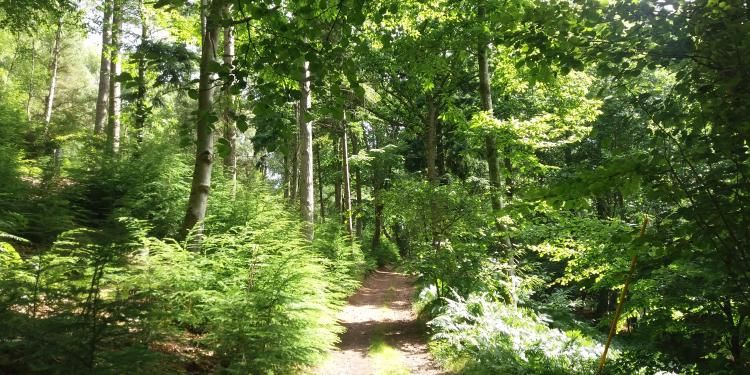
The story behind the innovative biomass project
Exmoor National Park can boast some of the best walking routes in the UK. The distinct landscape, spectacular views and wooded valleys are world famous. It is certainly no secret - thousands of tourists flock to the area every year in search of adventure.
What might be lesser known is the fact that Exmoor National Park Authority members have agreed an action plan to work towards the authority being carbon neutral by 2030 and the park is working with the UK’s 15 national parks on a co-ordinated plan to tackle climate change and biodiversity loss.
The park in south west England is committed to climate action putting it on track to join the UN-backed Race to Zero initiative of global climate leaders.
And since the next ten years are key for how we define how we live on this planet, the national park plays an important role.
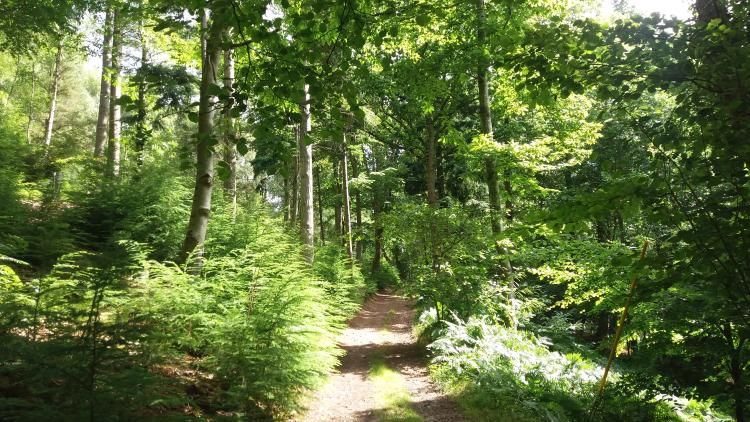
Exmoor National Park
Credit: Exmoor National Park Authority
Climate change
But what does this mean in reality? How is the park tackling climate change and how is the authority team planning for the future?
The Salix team discovered more when it was lucky enough to visit the off-grid Pinkery Outdoor Learning Centre. This centre offers insight into the Authority’s innovative approach.
On this wild moorland valley site, this is where the park team has installed a biomass boiler, a project funded by the Public Sector Decarbonisation Scheme. The scheme is run by the Department for Energy Security and Net Zero and delivered by Salix.
The site already benefits from wind and solar power. In fact, Pinkery will be one of the park’s first buildings to become fully net zero transforming it into a centre of excellence for sustainability and renewable technologies.
Technology aside, it is the place where thousands of young people stay every year and learn more about conservation and the natural environment. It is the hub of great inspiration – it is the place where dreams can be made.
For some young people, it can make all the difference to their future – how they see themselves and their place in the world and what impact they want to have and what impact they will have on the environment.
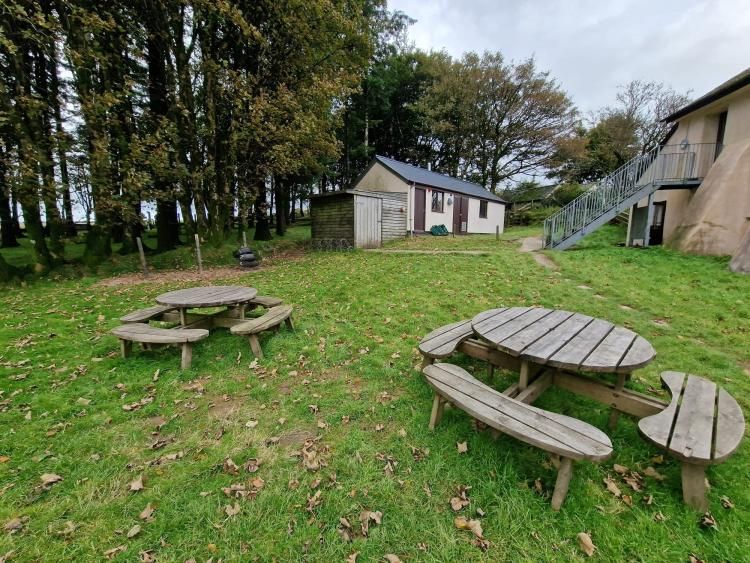
Pinkery Outdoor Learning Centre
Credit: Salix Finance
Biomass project
Now thanks to the new Pinkery biomass project, they, along with the Authority staff, have a lot more to learn about how we heat our buildings.
The newly installed biomass boiler has replaced outdated fossil fuel systems and will supply renewable heat and hot water for the whole site.
It will deliver 605 tCO2 savings over its lifetime, which is more than 30 tCO2 per year and is a renewable energy source generated from burning wood pellets, logs or chips.
Before the scenic and rugged drive up to Pinkery, after an overnight stay, the Salix team met Graeme McVittie, senior conservation officer for the Authority at the Exford tree nursery.
Graeme has managed woodlands for most of his career and whilst he explained how important it is that climate change is tackled on the global stage, he believes our woodlands are a vital part of the solution.
He said that it is crucial to demonstrate to people how woodland is conserved and protected. And as Upland oak woodland is the most widespread woodland on Exmoor and it’s important to conserve and monitor these areas.
At the Exford tree nursery, Graeme is overseeing the growing of saplings from seeds harvested from Exmoor. This means they are more likely to survive on Exmoor.
A lot of the wood is still used to create gates, posts and other park furniture – as well as being used to fuel the new biomass boiler at Pinkery.
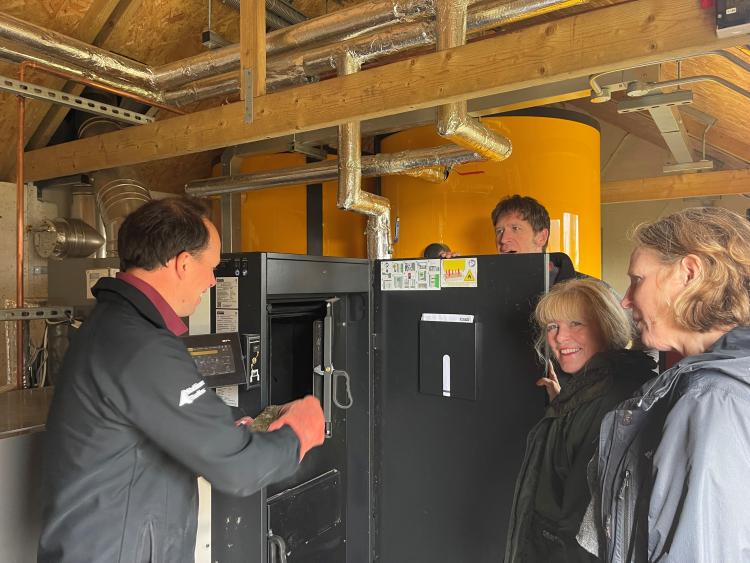
The biomass boiler at Pinkery Outdoor Learning Centre.
Credit: Salix Finance
Tree nursery
This is at the same time as an ongoing tree planting project ensuring that what is being planted will survive into the future as temperatures change.
Essentially the tree nursery site tells the narrative from sapling to boiler.
Graeme said: “We want to be able to tell the whole story whilst acknowledging the impact that climate change is having. At Exford we can show this, from the saplings to the sawmill, so from start to end.”
Although the Pinkery site may tell the ‘end’ of that story – it certainly offers a new future.
Dave Huxtable Pinkery Centre Manager is heavily enthusiastic about the new biomass boiler and has become an expert in operating it and monitoring its success.
He enthuses how now the centre, once an old farmhouse, is warm and the rooms are cosy and by monitoring the energy use through a large screen he can make sure it is used efficiently.
The outdated fossil fuel systems are now just a memory.
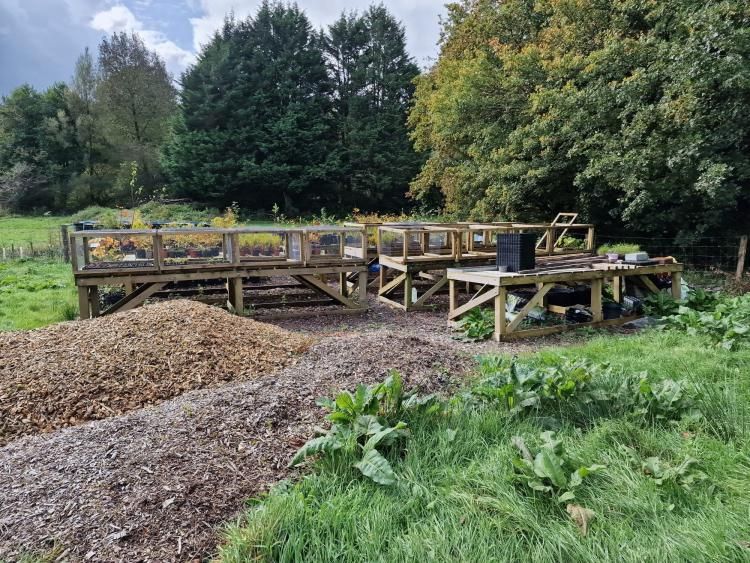
Exford Tree Nursery where the saplings are being cultivated.
Credit: Salix Finance
Learning
A huge part of Dave’s job is to ensure those young people visiting the centre have a memorable experience and he certainly never thought he would become quite so interested and expert in how the new Public Sector Decarbonisation Scheme biomass can work.
He said: “This project has been amazing and there is so much to learn from it. I would never have thought I would learn so much about renewable energy, and this is learning we can pass on.”
Learning and engagement manager Ben Totterdale said: “This site has massive challenges and now we have a boiler that is keeping us warm but also the works help the overall educational experience. This has been a great solution for Pinkery and we can move forward from this.”
Exmoor National Park Authority Chief Executive Sarah Bryan said: “We have created a green print for the future and the fact that the young people are so engaged is essential, our young people are the future.”
Chairman of Exmoor National Park Authority and Cabinet member for Climate change in Devon, Andrea Davis, said the centre was keen to share its learning.
She said: “I would encourage others to go for it, and although many smaller organisations don’t have the expertise to work on these kinds of projects, they can contact us, we are happy to share our learning. It’s all here!
“We really hope by demonstrating the great work we’re doing and sharing carbon reduction knowledge and resources, relevant to rural areas like Exmoor, we can encourage others to follow our lead.”
Somehow, I think this group of people will tell the story and they will inspire not only other national parks to act – but the generations to come.
Wouldn’t it be great if every young person could gain an insight into the learnings at Pinkery, see the huge efforts made in conservation and innovation – and be part of the excitement about the future, understanding the complex challenges of reaching net zero.
We will leave that with them.
- Thank you to Pinkery Outdoor Learning Centre for hosting the Salix team and to Clare Reid, Dave Huxtable, Sarah Bryan, Ben Totterdale and Andrea Davis for sharing their expertise.
- Overall the project received £115,211 from the Public Sector Decarbonisation Scheme.
- The new boiler has replaced outdated fossil fuel systems and will supply renewable heat and hot water for the whole site, including the classrooms and accommodation units.
- The works, together with the addition to the centre’s electric vehicles, its on-site wind turbine, solar panels and increased battery provision to power equipment, will bring Exmoor National Park Authority closer to its Carbon Neutral Goals.
- Pinkery provides educational resources to schools and other organisations that are interested in nature conservation and outdoor learning. It provides students with the opportunity to experience the unique environmental and cultural heritage of the park learning about climate change and experiencing the reality of sustainable living at Pinkery. For more information, visit: www.exmoor-nationalpark.gov.uk/learning/pinkery-centre
- The Pinkery building was originally built as an upland farmhouse and has been used by young people since 1969.
